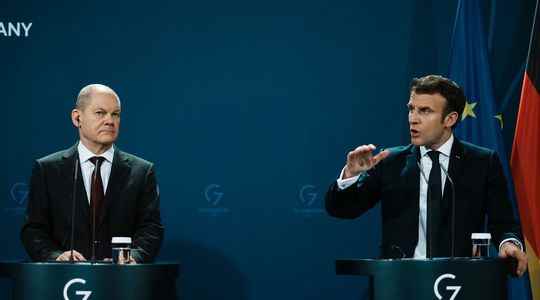By dint of abstractions, in diplomacy, the reading of the world can quickly become binary. On one side, the allies. On the other, the enemies. It seems that Vladimir Putin wanted to bring a hint of nuance by adopting a third way: “unfriendly countries”. Early March, in reaction to western economic sanctions, the Kremlin published a list of rival countries. Among them are the United States, members of the European Union, the United Kingdom, Canada, Japan, Switzerland, Taiwan, South Korea, Norway and Australia. These nations are more than ever in the eye of Moscow since the Russian president announced Thursday that they will now be forced to pay in rubles, from accounts in Russia, any purchase of Russian gas.
The transaction price does not change. “Russia remains faithful to its contractual obligations, in volume as well as in price. For the one who receives the Russian gas, who pays for the deliveries, there is in fact no change. They just acquire rubles for the amount in currency which is provided for in the contract,” said Kremlin spokesman Dmitry Peskov. But this new rule, which will come into force on Friday, obliges Russia’s trading partners, and mainly European countries, to resort to a foreign exchange transaction. What they have always opposed. Vladimir Putin announced his decision on Thursday on television after the signing of the decree enthroning him.
“If these payments are not made, it will be considered a breach of obligations on the part of the buyer, and this will have all the necessary consequences,” warned the Russian president. Clearly, any country that does not comply with the seller’s conditions will be deprived of supply. A red line for Europeans, starting with Germany, which instantly responded through the voice of its Chancellor, Olaf Scholz: “It is written in the contracts that payments are made in euros and sometimes in dollars”. Asserted and firm, he continued: “I made it clear to the Russian president that it would stay that way.” No question for Berlin or Paris to use the rouble, but then should we be prepared to give up Russian gas?
An ultra-dependent Germany
In the ministries, we are trying to adapt to the new deal imposed by Vladimir Putin. Traveling to Berlin, the French Minister of the Economy Bruno Le Maire, recognized it: the two countries must adjust. “It is up to us to prepare these scenarios, and we are preparing them,” said the former Minister of Agriculture. While Bruno Le Maire emphasizes the preparation of the European continent for the energy challenge, Germany is more offensive because it is one of the member countries most dependent on Russian resources. Committed to the Nord Stream 2 pipeline network aimed at bringing Russian gas to Central Europe, the country formerly led by Angela Merkel sees 55% of its energy consumption come from Russia.
To avoid the energy blackout, the Europeans have moved closer, since the beginning of the war, to the United States and its liquefied gas. Last week, US President Joe Biden announced the supply of an additional 15 billion cubic meters of gas to Europe. The European Commission has set itself a goal: to reduce Russian gas imports by two thirds from 2022. The pressure put by Vladimir Putin on Thursday should force the Europeans to speed up his march on his forecasts. It will divide, a little more, two extremities of a continent whose commercial exchanges are rarefied in the test of war.
